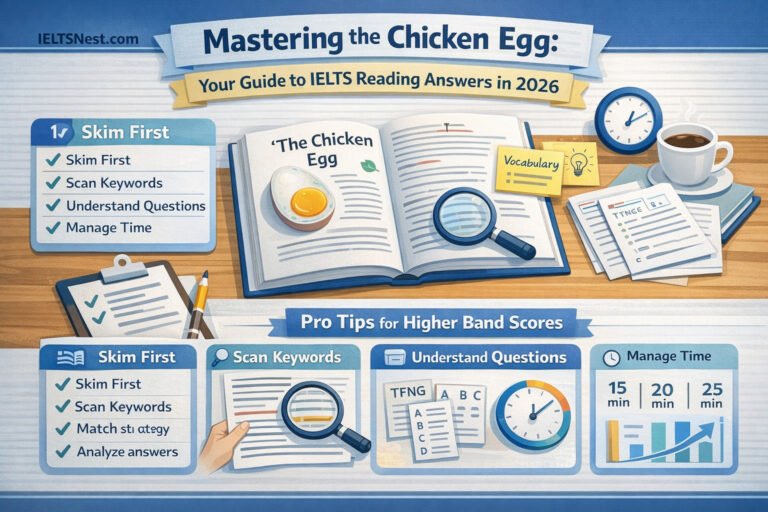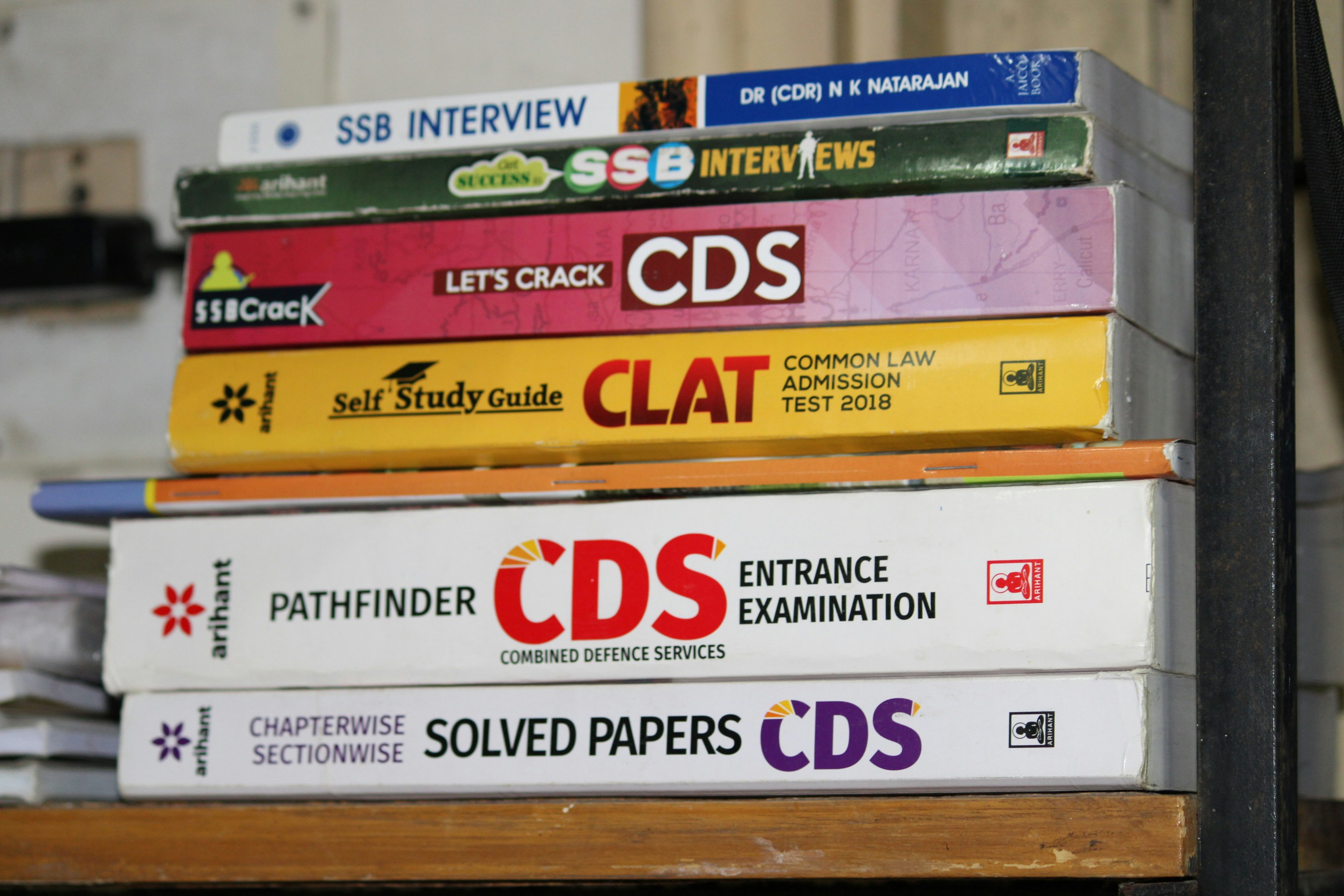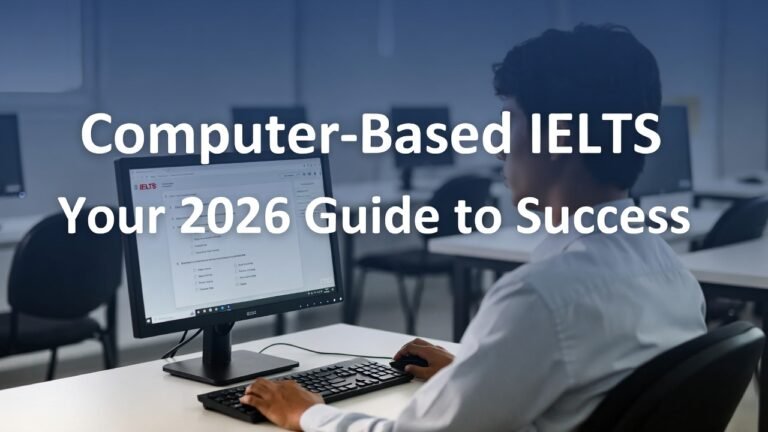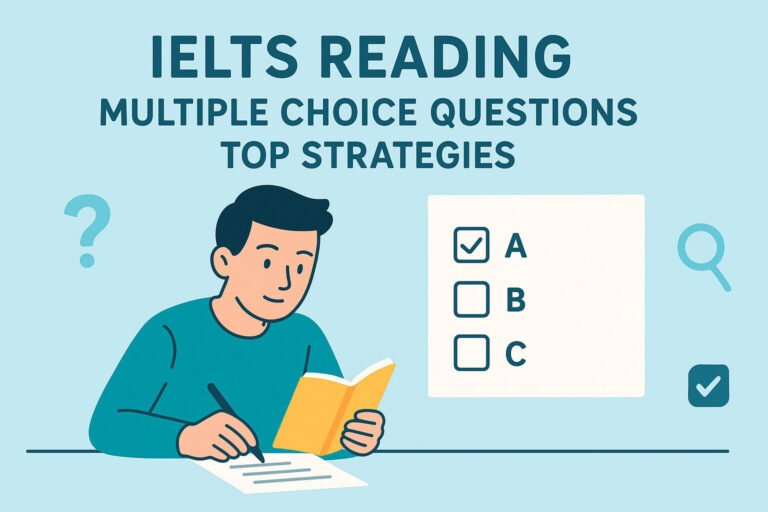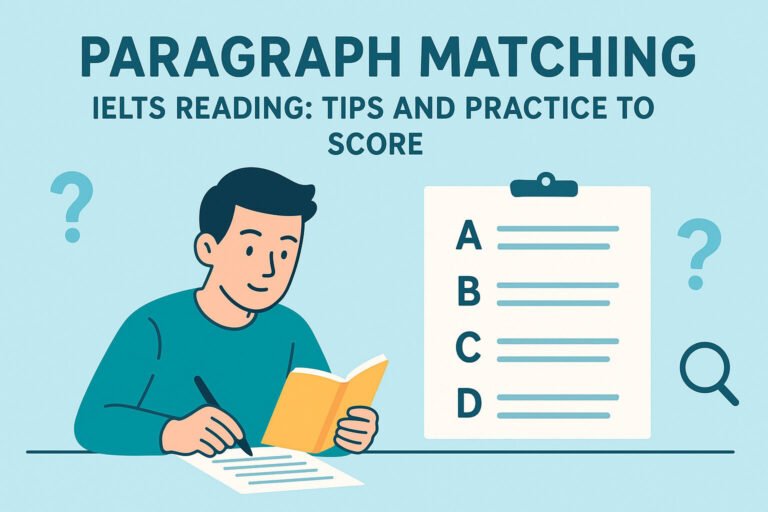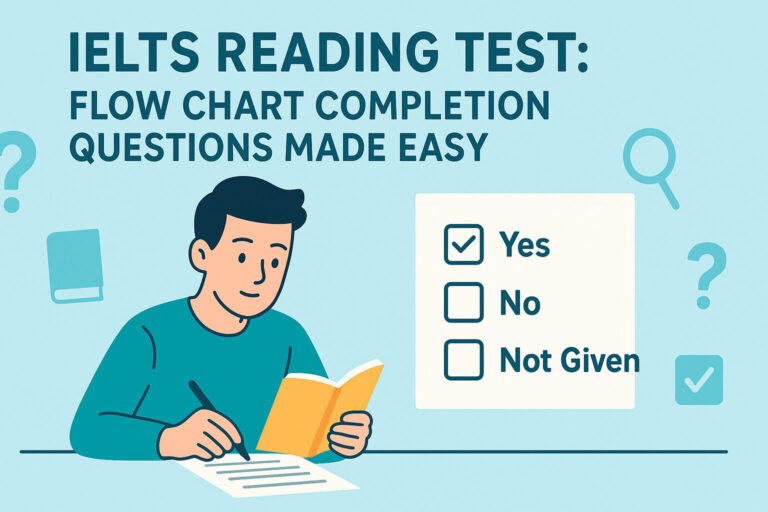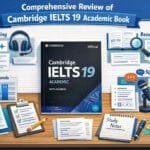Band 8+ in IELTS Reading with expert tips on summary completion questions. Discover strategies, samples, practice tests, and common pitfalls to ace this tricky task and boost your study abroad dreams.
IELTS Reading Summary Completion: Get Band 8+
Hey there, future global scholar! Imagine this: You’re knee-deep in your IELTS prep, dreaming of that acceptance letter from your dream university abroad. But then, bam—those sneaky IELTS Reading summary completion questions trip you up, and your Band 7 slips to a 6. Sound familiar? According to recent IELTS stats, over 40% of candidates struggle with these, losing precious points on paraphrasing and precision. Don’t worry—I’ve been where you are, guiding hundreds of 18-30-year-olds just like you to smash their goals.
In this ultimate guide, we’ll dive deeper than any other resource out there. You’ll get step-by-step strategies, real summary completion IELTS Reading samples, pro tips for IELTS Reading summary completion with and without clues, and even a mini practice test. By the end, you’ll tackle full and partial summary completion like a pro, making grammatically correct choices that skyrocket your score to 8+. Let’s turn that frustration into confidence—ready to level up?
What Are IELTS Reading Summary Completion Questions?
Picture this: You’ve skimmed a passage on climate change or urban wildlife, and now you face a gapped summary that tests if you truly grasped the essence. IELTS Reading summary completion is all about filling blanks in a shortened version of the text, proving your comprehension skills.
These questions pop up in all three Reading sections, often summarizing key ideas from one paragraph or the whole passage. They’re worth 1 mark each, and with 5-10 per test, nailing them can push you toward that elusive Band 8+.
Unlike multiple-choice, here you select words directly from the passage or a word bank—making synonyms and paraphrasing your secret weapons.
Types of IELTS Reading Summary Completion Questions
Not all summary completion IELTS Reading tasks are created equal. Understanding the variations helps you adapt on test day. Here’s a quick breakdown:
| Type | Description | Word Limit | Clues Provided? | Example Focus |
|---|---|---|---|---|
| Without Word Bank | Pull exact words/phrases (1-3 words max) straight from the passage. | No more than 3 words | No | Scanning for precise matches, e.g., renewable energy sources. |
| With Word Bank | Choose from a list of options (often 6-8 words/phrases). | As instructed | Yes | Matching synonyms, e.g., select solar power for sun-based electricity. |
| Full Summary | Covers the entire passage in one block. | Varies | Sometimes | Overall gist, like main arguments in a debate on tech ethics. |
| Partial Summary | Targets specific sections, like one paragraph. | No more than 2 words | Often | Detailed ideas, e.g., causes of urban sprawl. |
This table alone can save you time—print it out for your study wall!
Spot the type in under 10 seconds to choose your scanning strategy. Practice with mixed types to build flexibility.
👉 Join Our Telegram Channel to Download IELTS Academic/General PDF and Audios
🎧 Includes all Listening Audios + Speaking Videos + Answer Explanations + Writing Samples.
Why Master Summary Completion for Band 8+ in IELTS Reading?
Let’s be real: Band 8+ isn’t just about raw vocab—it’s proving you can handle nuanced ideas under pressure. IELTS Reading summary completion hones your ability to synthesize info, spot paraphrased synonyms, and maintain sequence (though watch out—IELTS Reading summary completion may/can break sequence sometime!).
For study abroad aspirants like you, acing this means standing out in competitive apps. Universities love seeing 35+ correct answers (out of 40) for Band 8, and these questions often decide that edge. Plus, the skills transfer to academic reading—think decoding lecture notes or journal abstracts.
Think of it as building a superpower: Better summaries = sharper critical thinking = smoother uni life abroad.
Aim for 90% accuracy here to hit Band 8+. Track your progress weekly—celebrate those jumps!
Step-by-Step Guide: How to Answer IELTS Reading Summary Completion Questions
Feeling overwhelmed? Break it down like this teacher-approved roadmap. Follow these steps religiously, and you’ll feel the shift in your practice scores.
- Read the Instructions First: Note the word limit (e.g., “NO MORE THAN TWO WORDS”) and source (passage or box). Underline keywords like from the text to avoid off-topic guesses.
- Skim the Summary: Spend 30 seconds reading the gapped text. Predict what fits—e.g., if it’s “The invention of _____ revolutionized travel,” think steam engine.
- Scan the Passage: Use summary completion IELTS Reading topics clues (like names or dates) to locate the relevant section. Highlight synonyms: innovation might mean invention.
- Match and Paraphrase: Plug in words that make the sentence grammatically correct. Test by reading aloud—does it flow? For IELTS Reading summary completion with Tips & Practice Tests, always double-check plurals or tenses.
- Transfer Answers Carefully: Copy exactly—no spelling tweaks! If it’s a word bank, cross out used options.
- Review Sequence and Logic: Ensure the summary flows logically. Remember, order might not match the passage—focus on meaning.
Practice this sequence daily for 15 minutes. You’ll internalize it like muscle memory.
Time yourself: 1-2 minutes per question. Speed + accuracy = Band 8 magic.
Essential Tips for IELTS Reading Summary Completion Band 9
Want that edge? These IELTS Reading summary completion tips are gold from my top scorers. They’re simple, actionable, and game-changing.
- Build Synonym Power: Summary completion examples thrive on spotting rapid urbanization for quick city growth. Use apps like Quizlet for daily drills—target 20 pairs a day.
- Focus on Grammar Glue: Gaps must fit seamlessly. If the summary says “The team _____ the project,” choose completed over complete for tense match.
- Handle No-Clue Gaps Boldly: For IELTS Reading summary Completion Questions with and without clues, lean on context. Predict part of speech (noun? verb?) before scanning.
- Time Management Hack: Allocate 20% of your Reading time here. If stuck, flag and return—don’t let one gap derail you.
- Vocab for Common Topics: Prep for summary completion IELTS Reading topics like environment (sustainable development), health (preventive measures), or tech (digital divide). Flashcards are your friend.
- Post-Practice Reflection: After each IELTS Reading summary completion sample, note why you missed—paraphrase fail? Rushed scan? Adjust accordingly.
Pro tip: Read aloud your filled summary. If it sounds natural, you’re golden.
Pick one tip per session. By week three, weave them all in for effortless Band 8+.
Common Mistakes to Avoid in IELTS Reading Summary Completion
Even bright students like you trip here—let’s dodge those pitfalls. I’ve seen them cost bands, but awareness fixes 80%.
- Ignoring Word Limits: Stuffing in four words when it’s “TWO MAX”? Instant zero. Always count!
- Copying Without Thinking: Grabbing the first match without grammar check leads to awkward sentences. Pause and verify.
- Missing Paraphrases: The passage says frustration, but you hunt for annoyance. Train your brain for flexibility.
- Breaking Sequence Blindly: IELTS Reading summary Completion Question with Tips warns: Summaries can reorder ideas. Prioritize logic over passage order.
- Over-Reliance on Word Banks: Even with clues, test if it fits the bigger picture—don’t autopilot.
Spot these in your mocks, and watch errors plummet.
Review last five practices for these errors. Turn “oops” into “aha” moments.
Sample Summary Completion IELTS Reading: Real Official Example
Time for action! Let’s dissect a genuine sample summary completion IELTS Reading from Cambridge. This one’s on language and instructions—perfect for seeing summary completion IELTS Reading answers in action.
The Passage (Excerpt)
The Cambridge Encyclopedia of Language, David Crystal, 3rd Edition. The instructions accompanying do-it-yourself products are regularly cited as a source of unnecessary expense or frustration. Few companies seem to test their instructions by having them followed by a first-time user. Often, essential information is omitted, steps in the construction process are taken for granted, and some degree of special knowledge is assumed. This is especially worrying in any fields where failure to follow correct procedures can be dangerous. Objections to material in plain English have come mainly from the legal profession…
The Summary Gaps
Complete the summary below. Choose NO MORE THAN TWO WORDS from the passage for each answer.
Consumers often complain that they experience a feeling of 1 ………… when trying to put together do-it-yourself products which have not been tested by companies on a 2 …………. In situations where not keeping to the correct procedures could affect safety issues, it is especially important that 3 ………… information is not left out and no assumptions are made about a stage being self-evident or the consumer having a certain amount of 4 …………. Lawyers, however, have raised objections to the use of plain English. They feel that it would result in ambiguity in documents and cause people to lose faith in 5 …………, as it would mean departing from language that has been tested in the courts for a very long time.
Band 9 Model Answers
- frustration
- first-time user
- essential
- special knowledge
- legal formulations
Step-by-Step Explanation
For gap 1: Scan for emotions around DIY—frustration jumps out, paraphrased from “source of unnecessary expense or frustration.” Gap 2: Look for testing—first-time user fits perfectly, no synonyms needed. And so on—see how grammar (e.g., “a feeling of frustration”) seals it?
Mini Takeaway: Replay this in your mind next test. Official samples like this build unshakeable confidence.
For more official gems, check out the Cambridge IELTS series—your go-to for authentic practice.
Quick Practice: Test Your Skills Now
Ready to apply? Here’s a fresh IELTS Reading summary completion practice on a hot topic: Urban Farming. (Passage: 150 words for brevity.)
Passage Excerpt: Urban farming is transforming cityscapes by integrating green spaces into concrete jungles. It reduces food miles, cuts carbon emissions, and fosters community bonds. However, challenges like limited space and soil contamination persist. Innovators use vertical gardens and hydroponics to overcome these, yielding fresh produce year-round. Studies show participants report lower stress levels, proving mental health benefits too.
Summary (No Word Bank): Choose NO MORE THAN TWO WORDS from the passage. Urban farming integrates 1 ………… into cities, lowering 2 ………… and strengthening ties. Despite issues like 3 …………, solutions such as 4 ………… enable constant harvests. Research highlights gains in 5 ………… health.
Answers (Scroll Down—Don’t Peek!): 1. green spaces | 2. carbon emissions | 3. limited space | 4. vertical gardens | 5. mental.
How’d you do? Score 4-5? You’re Band 8 material!
Do one daily. Share your scores in comments—we’re in this together.
Dive deeper into visuals with our internal guide on IELTS Writing Task 1 Bar Chart Sample Answer—perfect for rounding out your skills.
FAQ: Your Burning Questions on IELTS Reading Summary Completion
Got queries? These cover the “People Also Ask” hits, straight from my students.
Q: How many summary completion questions are in IELTS Reading? A: Typically 5-10 across sections, but it varies. Focus on speed to handle them in 60 minutes total.
Q: What’s the difference between summary completion and note completion? A: Summaries paraphrase the whole idea; notes are bullet-point facts. Both test scanning, but summaries demand more synthesis for Band 8+.
Q: Can I use words not in the passage for summary completion? A: Nope—stick to the text or bank, or it’s wrong. Build vocab to spot those hidden matches.
Q: How to improve paraphrasing for summary completion IELTS Reading band 9? A: Read BBC articles daily, rewrite headlines in your words. Aim for 10 exercises weekly.
Q: Are there summary completion questions in IELTS General Reading? A: Yes, similar format but everyday topics. Strategies transfer seamlessly.
Q: What’s a quick tip for time-strapped students? A: Predict gaps before scanning—saves 30 seconds per question!
Wrapping Up: Your Path to Band 8+ Starts Today
Whew—what a journey! From decoding types to crushing samples, you’ve got the toolkit to conquer IELTS Reading summary completion and beyond. Remember, every pro was once a nervous aspirant; your dedication will shine through on test day.
You’re not just prepping for a score—you’re unlocking doors to epic adventures abroad. So, what’s next? Grab our free IELTS Reading summary completion practice PDF (link in bio), tackle that mock test, or drop a comment with your biggest win. Let’s chat—I’m rooting for you!


